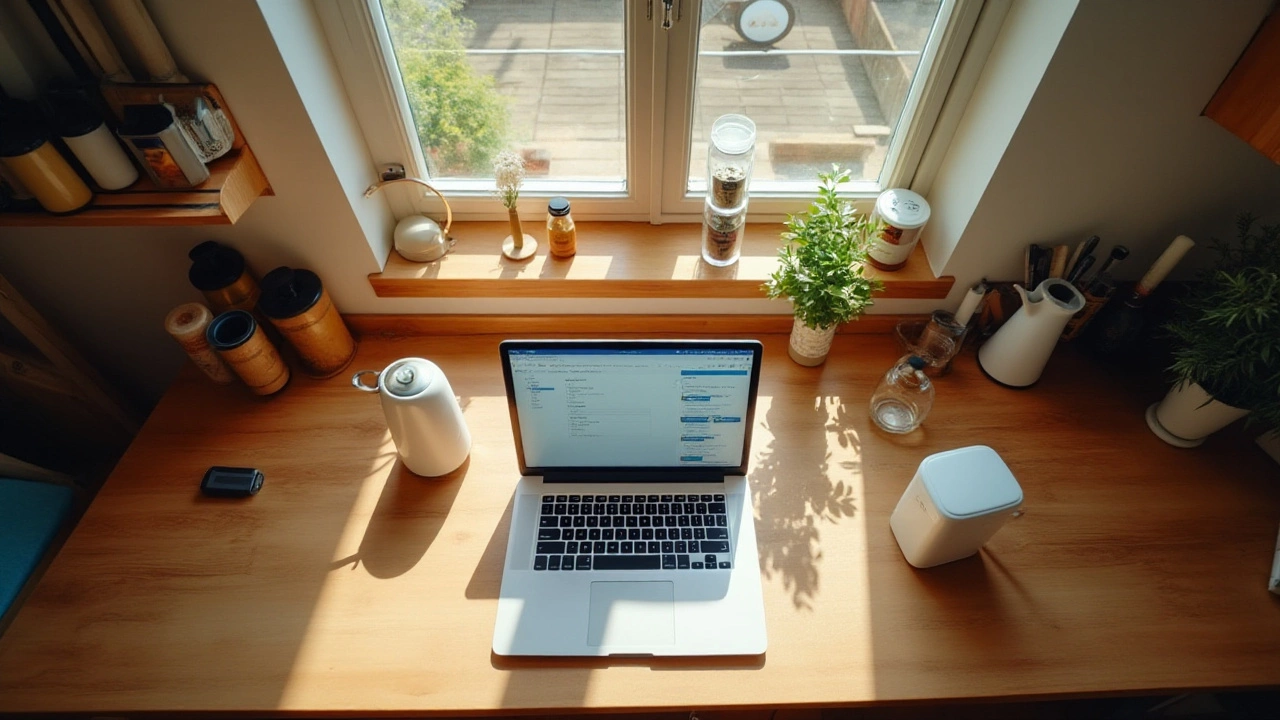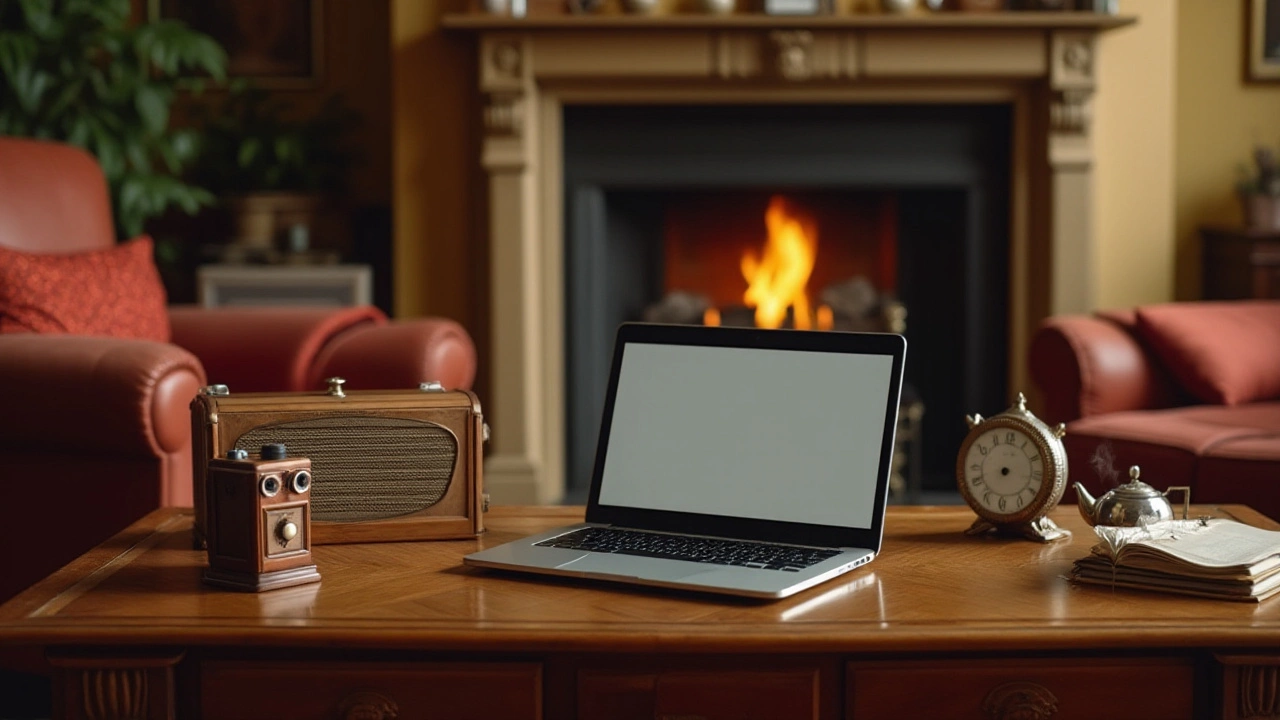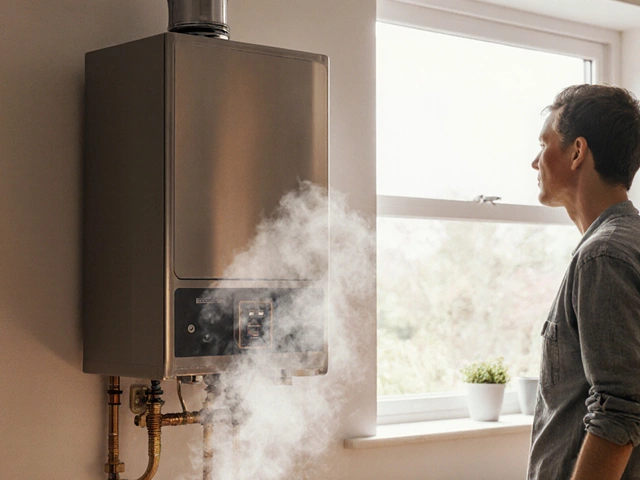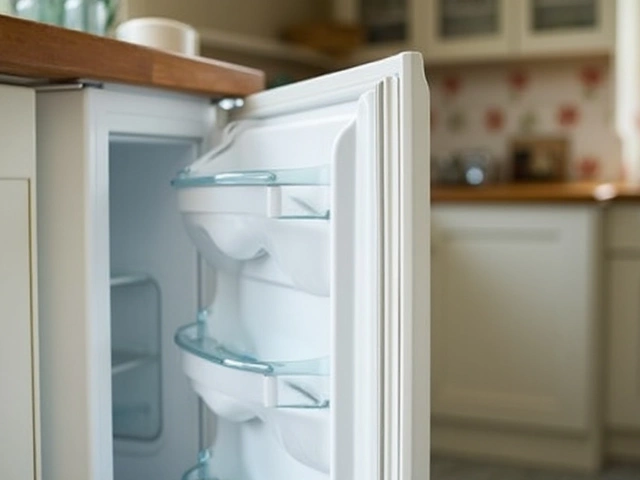As we step into 2025, the digital age continues to transform the way we perceive traditional appliances. Devices like refrigerators, toasters, and washing machines find themselves sharing space with gadgets such as laptops, blurring the lines between necessity and convenience. But where do laptops fit in this modern ecosystem? Are they merely sophisticated gadgets or have they earned the title of a fundamental home appliance?
To determine if a laptop qualifies as an appliance, we need to consider its functionality alongside more conventional household items. This gadget has become integral to our everyday lives, serving purposes from work to entertainment. It is hard to imagine a day passing without its utility, much like other indispensable appliances. Yet, does it meet the criteria traditionally reserved for what we call household appliances?
By unpacking the unique role laptops play, we'll dive into their evolution as household staples, offering insights into their growing status in our personal and professional spheres. We will also highlight essential tips for maintaining your laptop, ensuring it remains as reliable as any other appliance in your home.
- Defining an Appliance
- The Evolution of Home Electronics
- Laptops as Daily Essentials
- Maintenance and Care
- The Future of Digital Appliances
Defining an Appliance
When we think of an appliance, our minds typically envision trusty household helpers like refrigerators, ovens, and washing machines. These devices are designed to perform a specific task and, in many cases, become focal points of our daily routines. But what truly defines an appliance? The Oxford Dictionary suggests that an appliance is a device or piece of equipment designed to perform a specific task. However, the technological landscape has evolved significantly, expanding this definition to include modern electronics like laptops.
Traditionally, appliances are characterized by their purpose and functionality within the home. They are often categorized based on their roles: kitchen appliances for cooking and food storage or laundry appliances for cleaning clothes. While a laptop might not cook dinner or wash clothes, it serves as a portal to the digital world, proving essential for communication, entertainment, and even productivity. Its role, though not physically tangible, addresses major needs in our daily life, very much like how a microwave provides quick meals.
One could argue that the essence of an appliance lies in its utility and impact on quality of life. A laptop, by these metrics, checks numerous boxes as it facilitates remote work, enables virtual learning, and offers a platform for relaxation through streaming services. The transition of several activities from physical to digital realms due to technological advancements has allowed the laptop to become a crucial component of contemporary existence. As such, it's not just a tool; it's part of the home ecosystem, supporting societal shifts toward digital integration.
A Broader Perspective
"Appliances are no longer about mere convenience; they're about connecting us with our world," said Sarah Tibken, a technology analyst at a leading firm. The quote encapsulates the shift in how we categorize appliances today, recognizing that many fulfill hybrid roles beyond traditional boundaries.
Moreover, engineers and designers have reimagined the concept of household appliances, creating versatile smart devices that can perform a variety of tasks. This adaptability places laptops in the running as they merge communication, information processing, and entertainment in a single, portable format. While their primary function may differ from conventional appliances, their influence on our daily life is no less significant. Reflecting on what society deems essential can reveal why the concept of an appliance has broadened.
Technology's Influence
The influence of technological innovation cannot be understated; it continually redefines what an 'appliance' can be. Companies are constantly developing products that amalgamate capabilities of multiple devices into one. For example, smart refrigerators not only cool groceries but also offer internet connectivity. Parallelly, laptops too blend capabilities, fitting the mold of multifunctional devices designed for the modern era. Laptops have seamlessly infiltrated domains traditionally held by household machines, due to their ability to serve varied needs with flexibility. This capacity to integrate into and complement our daily routines defines the true essence of being a modern appliance.
The Evolution of Home Electronics
Over the decades, the evolution of home electronics has reshaped our households into hubs of convenience, comfort, and connectivity. Initially, the term 'appliance' largely referred to mechanical conveniences such as stoves and sewing machines. These machines required manual input, which defined much of the 20th-century homemaking landscape. As time progressed, technology brought forth an emergence of electronically powered devices, gradually transforming how appliances were understood and utilized in our homes.
The 1970s and 1980s witnessed a significant leap with the introduction of electronics like the microwave oven and washing machine automation, which unequivocally altered daily routines. Yet, it was not until the digital revolution of the late 20th century that our understanding of appliances expanded further to embrace digital technology, with computers slowly finding their place within our living rooms and offices. They facilitated a level of interaction that traditional appliances could not match, propelling them from luxury items to near-necessities.
In these transformative years, laptops emerged as a compact and portable solution, enabling us to take the power of computing beyond the physical bounds of a desktop setup. The portability factor not only made laptops desirable but facilitated a change in lifestyle where work and leisure could coexist on a single device. According to a 2021 study by Pew Research, over 75% of Americans owned a laptop, reflecting their growing integral role in the fabric of everyday life. As Michael Miller noted in his book 'Living in a Digital World', "The difference between appliances and personal electronics is closing faster than we imagine."
At the cusp of the new millennium, laptops evolved swiftly, boosted by improvements in battery life, processing power, and internet connectivity. These advancements paralleled those of other household innovations like smart fridges and voice-controlled assistants, which have further blurred the lines between functional devices and interactive technology. Today, a laptop isn't simply a tool for heavy computing tasks but a versatile aide for tasks ranging from streaming videos to controlling smart home networks.
This evolutionary journey highlights how laptops have not only adapted to new demands but have also driven a shift in how we perceive electronics. The blending of digital and mechanical aspects in home gadgets indicates an ongoing transformation where personal devices become household staples. This shift raises a pivotal question on the nature of appliances, pushing us to reconsider what it means to depend on a machine in our homes.
The evolution of home electronics—and of laptops in particular—demonstrates an ongoing change deeply rooted in technological advancements and lifestyle alterations. As homes become smarter and demand for connectivity grows, the laptop stands as a testament to where we've been and where we're headed in the realm of home technology.

Laptops as Daily Essentials
In modern households, the laptop has quietly become as crucial as a refrigerator or a microwave, intertwining itself with our daily routines. Whether it is for work, leisure, or communication, this compact marvel of technology is truly a mainstay in our lives. As working remotely becomes more normalized, especially after the shake-up of the early 2020s, access to a reliable laptop is non-negotiable for professionals across the globe. Its portability allows the entire office to shrink down to something you can carry in a backpack, breaking the chains of traditional cubicles and heralding the era of the digital nomad. Yet, its worth doesn't end at mere professional usage.
Laptops have also redefined how we consume media and connect with others. Streaming services, once the domain of living room televisions, now find themselves at our fingertips. Catching up on the latest binge-worthy series or following live sports is as simple as opening a browser. Almost seamlessly, they blend into the fabric of relaxation, offering endless hours of entertainment without the need for additional complex systems. It's rare to find a day without reaching for our laptops to answer an email, look up a recipe, or video call a distant friend. The proliferation of these versatile machines is underscored by the astonishing statistic that, according to Statista, over 220 million laptops shipped worldwide in 2022 alone.
The classroom also isn't immune to this digital intrusion. With the rise of e-learning platforms, education is accessible from anywhere. Laptops serve as the main conduit through which knowledge is disseminated on these platforms. They have become the notebooks of our age, storage for everything from lesson plans to interactive learning modules. An interesting observation made by the Pew Research Center during a 2023 survey suggested that around 75% of students in the U.S. preferred using laptops over tablets for studying, underlining this remarkable transition. Charles Dickens once remarked, "The pain of parting is nothing to the joy of meeting again," a sentiment that today's laptops encapsulate perfectly as they effortlessly bridge distances, bringing us closer to those far from us.
"Technology is best when it brings people together." — Matt Mullenweg, Developer of WordPress
For enthusiasts and tech-savvy individuals, laptops offer endless customization and upgrade opportunities. Components like RAM, storage drives, and even cooling solutions are often upgradable, ensuring your laptop remains relevant over the years. This adaptability is characteristic of appliances that are designed to serve long-term purposes. Whereas a toaster might toast, and only toast, a laptop does much more than its initial promises. And as we peek into the future, innovations such as folding screens and improved battery technology promise to enhance their utility, blurring the boundaries of what we traditionally view as household appliances. The fact that they have secured such an integral role without us even realizing it speaks volumes about their importance in our present-day lives.
Maintenance and Care
Taking care of your laptop is much like maintaining any other home appliance. It demands attention, regular cleaning, and a bit of knowledge about how its parts function. The goal is to ensure its longevity and optimal performance, something any laptop owner can achieve with a few mindful practices. Let's dive into what makes up a comprehensive maintenance routine for a laptop.
Regular Cleaning
One of the simpler yet crucial tasks is keeping your laptop clean. Dust buildup can affect the ventilation system, potentially leading to overheating. To prevent this, use a microfiber cloth to gently wipe the screen and the body. A small can of compressed air is invaluable for cleaning the keyboard and vents. Ensuring your laptop is debris-free can save you from a multitude of performance issues down the line.
Software Updates
Just as you wouldn't neglect a refrigerator's filter change, neglecting software updates on your laptop can compromise its efficiency. System updates often include security patches and performance improvements. Configuring your laptop to update automatically can be a savior for those who often forget. This proactive approach ensures your device stays protected against potential cyber threats that could disrupt your daily tasks.
According to a study by TechRadar, "Regular updates can improve your laptop's performance by up to 20%, providing a smoother user experience and extending the overall lifecycle of the device."
Battery Health
The battery is arguably one of the most critical parts of your laptop. To prolong its life, avoid keeping your laptop plugged in all the time. Instead, aim for a charge cycle that balances between letting the battery drain and recharging before it hits empty. If your laptop allows it, invest in energy efficiency settings to stretch battery life when usage is not too demanding.
Security Measures
Guarding your laptop against malicious software is as vital as locking your doors at night. Invest in reputable antivirus software and enable any built-in security features your laptop offers. Regular scans and internet safety practices, such as being cautious with email attachments or downloads, are excellent habits. These strategies can protect sensitive information stored on your device, making it less susceptible to cyber attacks.
Resilient Storage
Data storage shouldn't be neglected, either. Keeping backups of important data on external drives or cloud services can safeguard against data loss. Organize files periodically to ensure you're not facing the dreaded "disk full" message, which can slow down performance.Electronics often require these digital tidying routines to keep functioning at their best.
Much like other appliances in our homes, laptops need a reasonable amount of attention to perform their roles efficiently. By embracing these maintenance tips, you extend the life of your laptop and secure the investment made in this indispensable device.

The Future of Digital Appliances
The future of digital appliances paints an exciting portrait of technological evolution, where the lines distinguishing traditional appliances from electronics like laptops will increasingly blur. As we stand on the cusp of this new era, the distinction between utility and convenience gives way to multifaceted devices that enhance efficiency and connectivity in unprecedented ways. In this changing landscape, it's no surprise that the humble laptop is becoming a cornerstone of every household, transitioning from its role as a mere workhorse into an indispensable home appliance.
In the near future, we are likely to witness the integration of Artificial Intelligence (AI) into everyday devices, streamlining operations and customizing user experiences. Laptops, with their inherent adaptability, will be at the forefront of this change, learning user preferences to deliver tailored recommendations and solutions. This intelligent integration expands on their existing capabilities, offering everything from smart home management to personal health monitoring. This automation will likely reduce the need for multiple stand-alone devices, consolidating functionality into singular, adaptable units. As mentioned by a tech vision document, "The versatility of laptops positions them as key components in the smart home ecosystem."
Connectivity is another vital aspect in the development of digital appliances. The Internet of Things (IoT) concept already lays the foundation for inter-device communication, and with ongoing advancements, laptops will play a pivotal role as control hubs. They will seamlessly interface with other smart devices, from thermostats to security systems, all controlled through intuitive applications displayed on their screens. This synergy not only optimizes energy usage but also fundamentally changes how we interact with our living spaces. The real-time monitoring and management capabilities of laptops make them indispensable in this connected environment.
Looking ahead, we anticipate a surge in customization options driven by consumer demand for personalized experiences. As a result, laptops will likely offer modular components, allowing users to upgrade and modify their systems according to specific needs without replacing entire units. This shift towards sustainability and personalization is a positive trend, promising greater consumer satisfaction while reducing electronic waste. Statistics from the Environmental Protection Agency underscore the importance of this development, illustrating the potential reduction in e-waste through modular technology solutions.
Another emerging trend is the role of immersive technologies, such as Virtual Reality (VR) and Augmented Reality (AR), as part of everyday laptop use. These technologies will likely become integral to both personal and professional realms, enhancing everything from gaming to educational experiences. As the hardware that underpins these functionalities becomes more sophisticated, laptops will undergo a transformation, incorporating high-performance graphics and sensors to support immersive applications. The ongoing refinement of VR and AR showcases a compelling glimpse into how our understanding of home devices continues to evolve.





